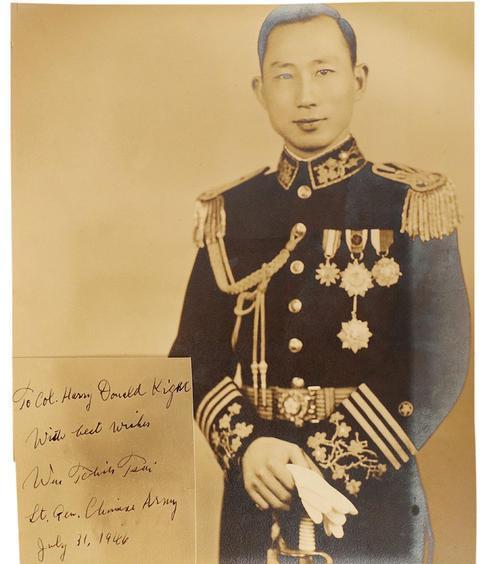The reason why the Kuomintang defeated and retreated to Taiwan was not because of the lack of talent in the party, but because the dictatorship of the old Chiang Kai-shek led to the loss of talent and the people's desire to betray the people. For example, this general Cai Wenzhi was a general who dared to independently express his opinions in the Kuomintang army, so what was his end?

Born in 1911 in Huanggang, Hubei Province, General Cai Wenzhi attended the Japanese Army Non-Commissioned Officer School in his early years. While Cai Wenzhi was studying in Japan, the Japanese Kwantung Army arranged for the railway "garrison" to blow up the south Manchuria Railway tracks near Shenyang's Wicker Lake, and planted bribes on the Chinese army and shelled the Shenyang North Camp, resulting in the "918 Incident". In order to express his dissatisfaction with the Japanese invasion of the three eastern provinces, he and his Chinese students resolutely dropped out of school and returned to China, and later entered the ninth phase of the Whampoa Military Academy, serving in the Kuomintang Military Headquarters of the old Chiang Kai-shek, and during the War of Resistance Against Japanese Aggression, he was promoted to the director of the Second Division of the First Department of the Military Headquarters, and later served as the chief of staff of the Beiping Military Investigation Department.
Cai Wenzhi was later reused by the elder Jiang because he dared to express his views.
It was at a combat conference before the Battle of Taierzhuang.
That time, when old Jiang personally went to Xuzhou, he proposed to use the strength of the whole country to have a duel with the Japanese army in Taierzhuang. The veteran general's determination was unanimously praised by everyone, but at this very moment, the small section chief who attended the meeting boldly put forward his own opinion, believing that the Japanese army is strong and our army is weak, and if we fight to the death, we will definitely suffer losses. The war against Japan should adopt protracted tactics to drag down, drag down, and eventually drag the Japanese army to death.
As soon as the participants heard that this hairy young man dared to deny Old Jiang's views, they all sweated for him. Surprisingly, Cai Wenzhi's opinion was instead appreciated by Lao Jiang and heeded his advice.
Since then, General Cai Wenzhi has become an important member of the old Chiang Kai-shek think tank, and he also accompanied the old Chiang to the Cairo conference, and was later promoted to deputy chief of staff of the army headquarters lieutenant general.
Cai Wenzhi was a man with a temper, and when he was serving in the Beiping Military Adjustment Department, he had a fierce quarrel with our representative Geng Biao, which became an interesting historical case.
Later, before the Battle of Shanghai, Cai Wenzhi and Tang Enbo had a big quarrel, which was a manifestation of his complete disappointment with the old Chiang's policy, which eventually led to him hanging up the crown and leaving.
So much so that when he recalls the scene in his later years, he will cry because of his mixed feelings. When Tombaugh rushed out the door, he also threw off his military hat, disarmed himself, declared that he could no longer do it, and automatically left his post.
So what happened to Cai Wenzhi later?
After Chiang Kai-shek's defeat in Taiwan, Tsai went to Hong Kong and later settled in the United States. He was hired as an advisor to the U.S. Department of Defense in 1950 and became a U.S. citizen.
Although I am in the United States, my heart is still the heart of China. Through reflection and comparison for a period of time, General Cai Wenzhi was deeply disappointed in the Kuomintang regime and praised the increasing progress and prosperity of the socialist motherland under the leadership of our party. In 1980, when Cai Wenzhi learned that his rival Geng Biao, who had quarreled in the past, visited the United States, he took the initiative to invite him to come to the united states through relevant departments. When the two generals met in the United States, they both lamented to each other that "they did not fight and did not know each other", and they "met each other and smiled and hated each other".
After that, Cai Wenzhi returned to China at the invitation of Ye Shuai, and when he visited various places through sightseeing, he deeply admired the successful leadership of our party and was glad for the progress of the motherland's economic construction and the stability of the people's lives.
After returning to the United States, General Cai Wenzhi has always devoted himself to the reunification of the motherland, and has often written articles for the "People's Daily," "Unity Daily," "Ta Kung Pao," and the American "China Daily, calling for the peaceful reunification of the motherland, and attacking the "Taiwan independence" forces.
On January 9, 1994, General Cai Wenzhi died in the United States at the age of 83.
More Exciting Articles:
In his lifetime, he was awarded the rank of major general three times, and then he was cut down to the people for a sentence of exculpatory, but he died at the age of 100
The director of the political department of the Red Fourth Front, there were 6 people before and after, why did he become the founding general alone?